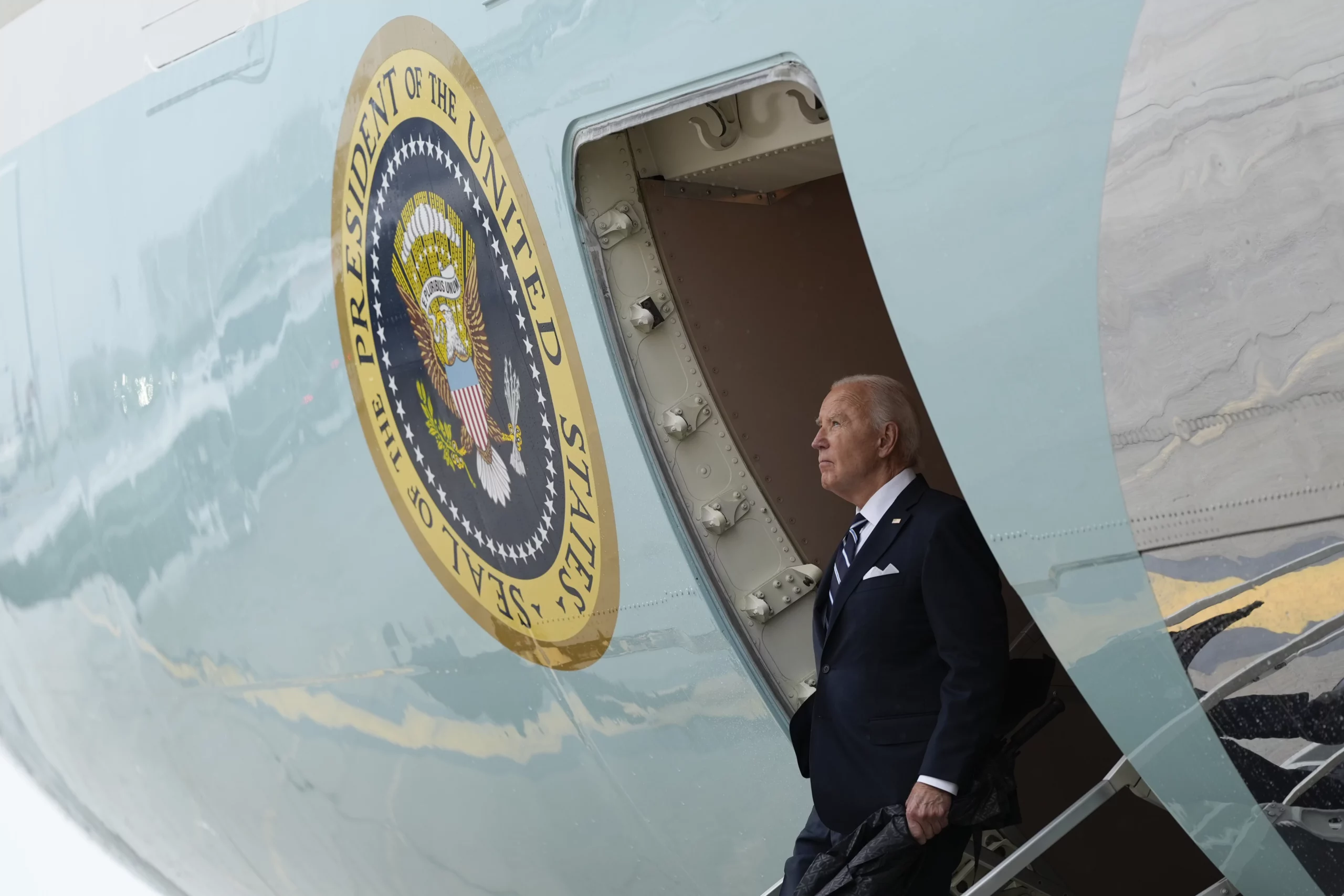

President Joe Biden will deliver his final address to the United Nations as escalating tensions in the Middle East threaten any hope of peace before the end of his term.
The president will defend the accomplishments of his four years in office when he speaks before the General Assembly on Tuesday, including his administration’s work to build alliances in the Indo-Pacific and defend Ukraine’s sovereignty.
But Biden will also attend the annual conference in New York City in the same circumstance that marked each of his prior addresses. The president promised to reengage with the world and restore America’s reputation in the process, but at each turn, he’s been forced to defend his record against the backdrop of an unstable and war-torn world.
Biden first addressed the U.N. as president in 2021, months after his chaotic withdrawal of U.S. troops from Afghanistan. In 2022, he spoke to the body after Russia invaded Ukraine. His remarks in 2023 came after China flew a surveillance balloon across the country, challenging America’s supremacy over its own skies. Now, in 2024, his appearance coincides with an escalation in violence in the Middle East.
Biden has for months tried unsuccessfully to broker a ceasefire after Hamas invaded Israel. The conflict, which sparked a casualty-heavy counterresponse by Israel, has only grown more dire as the war increasingly expands to Hezbollah in Lebanon.
In a background briefing on Monday, senior administration officials previewed that Biden would use his U.N. address as an opportunity to demonstrate that his pledge of renewed “American leadership” has “produced results.”
“We have a story to tell about what we’ve done to rally the world to defend Ukraine’s sovereignty, uphold principles of the U.N. Charter, what we’ve done to manage responsibly our competition with other countries, including China, and also what we’re doing to deal with the ongoing and serious conflicts in our world in places like Gaza, where the president’s worked tirelessly to get a hostage ceasefire deal, and conflicts like Sudan, where you have absolutely unprecedented displacement and a really serious crisis that we think needs to get more attention,” one administration official told reporters.
But to the administration’s critics, Biden did not so much confront the world’s problems as create them with a foreign policy that signaled weakness to America’s adversaries.
Richard Goldberg, a senior adviser at the Foundation for Defense of Democracies, called Biden’s term a “four-year case study indicting an ‘American Last’ foreign policy.” He argued the administration invited Russia’s invasion of Ukraine through an “appeasement strategy combined with his disastrous Afghanistan withdrawal.”
On Israel, he claimed that Biden has hamstrung its war through its ceasefire negotiations.
Biden has found success repelling Russia’s invasion of Ukraine, finding a path in Congress to usher through more aid despite Republican skepticism over a drawn-out war. He’s also built new partnerships in the Pacific, including AUKUS, an alliance of Australia, the United Kingdom, and the United States, meant to counter the rise of China.
“The president’s engagements this week reflect his vision for a world where countries come together to solve big problems,” one administration official told reporters.
“We’re going into a General Assembly this year with the world facing many steep challenges, problems so big no one country can solve them on their own,” the official said, calling Biden’s “vision of countries working together” a hallmark of his foreign policy legacy.
But Biden’s attempts at multilateralism, seen as a response to former President Donald Trump’s more noninterventionist policy, have at times hit seemingly intractable roadblocks. The president failed to resuscitate the Iran nuclear deal early in his tenure and, more recently, has been unable to bring the war in Gaza to a close, despite delicate negotiations between U.S. and Arab mediators.
The White House is portraying Biden’s U.N. address as a valedictorian speech, but “the problem is he’s not a valedictorian,” according to Gabriel Scheinmann, executive director of the Alexander Hamilton Society.
“As president for the last four years, as vice president for eight, and then, before that, a 36-year career in the Senate, he actually doesn’t have a lot to show for it when it comes to lasting accomplishments,” Scheinmann, who spearheads the international affairs membership organization, told the Washington Examiner.
Brett Schaefer, a senior research fellow on international regulatory affairs at the Heritage Foundation, said some world events were out of Biden’s control, citing China’s ambitions in the South China Sea, Taiwan Strait, and beyond.
But he said the choices Biden made as president had contributed to the conflicts abroad, especially in the Middle East.
“In some ways, particularly China, it has been getting steadily more aggressive over the past 10 to 15 years and so perhaps that might not be much different, but if you take a look at the Middle East, it’s hard to say that Biden’s policies haven’t been instrumental in sowing chaos there,” the former U.N. and Pentagon staffer said. “While not everything that is spinning seemingly out of control around the world can be laid at Biden’s feet, certainly his policies have contributed to that in major ways.”
Jon Alterman, senior vice president for the Middle East program at the Center for Strategic and International Studies, said he will be watching to see how Biden tries to shore up his legacy in the final months of his term. But he predicted that foreign leaders will be equally focused on the policy implications of the next administration, whether led by Trump or Vice President Kamala Harris.
“It’s a question about how seriously other heads of state, heads of government, foreign ministers are going to invest time and effort into engaging with the current administration rather than focusing on what might happen in the future by trying to get meetings and exchanges with the Harris team or the Trump team,” he said.
To that end, Ukrainian President Volodymyr Zelensky will use his visit to the U.S. to personally present a “victory plan” for the war with Russia to not only Biden but also Harris and possibly Trump this week. The plan incorporates a request for more military assistance, in addition to permitting Ukraine to deploy U.S. equipment and ammunition with fewer restrictions.
Biden’s address Tuesday will be followed by meetings with U.N. Secretary-General Antonio Guterres and Vietnamese President Cho Lum, a keynote climate speech, as well as summits concerning Ukraine reconstruction and synthetic drug threats.
After Afghanistan, Biden has repeatedly referenced Ukraine as an instance of U.S. leadership, especially at the start of the war.
“There’ll be high-level meetings on the future of multilateral cooperation, sea level rise, antimicrobial resistance, really every big major challenge,” the administration official said. “We’ll have senior U.S. representatives at all of these main events on issues, such as the impact of emerging technology and specific meetings on global crises, such as the difficult situations in Haiti, Sudan, Venezuela, Ukraine, Syria, and the Rohingya refugee crisis.”
“Other U.S.-hosted and U.S.-attended side events will focus on the climate, scaling clean energy for Africa, a major core group meeting of countries committed to LGBTQ rights,” he added. “We’re going to use this high-level week, the president’s last U.N. General Assembly, to get as much done for the American people.”
CLICK HERE TO READ MORE FROM THE WASHINGTON EXAMINER
Biden’s U.N. address comes after the White House circulated a memo related to its approach from now until Jan. 21, when the new president will be inaugurated.
“When the president decided to step back from the campaign and endorse the Vice President, he called his senior team together that day and said we need a plan for the next 180 days to finish as strong as we started,” White House communications director Ben LaBolt wrote Monday. “Every day the president meets with his team, he is pushing to lay it all out on the field for the remainder of the term.”





